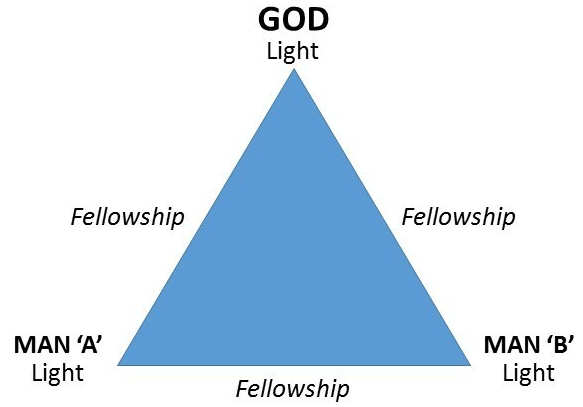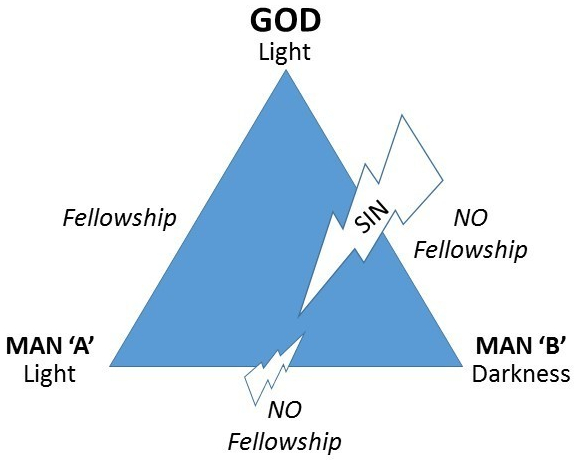 As was noted previously, fellowship with God and man is contingent upon one thing. It is that which inheres in the term “fellowship.” “God is light and in Him is no darkness at all. If we say that we have fellowship with Him, and walk in darkness, we lie and do not practice the truth” (1 John 1:5b-6). Is there commonality between God and the man in spiritual matters? Does his belief, practice, and character adhere to all things revealed by God to be “light?” It matters not if a fellow says he has fellowship with God if indeed he does not. Is he in the light as God is in the light? Then he has fellowship with God. Is he walking in darkness? Then he does not have fellowship with God. Just as truth is objective, and cannot be changed by simple emotion, so it is with fellowship. The only way a man can change his standing with God is to come to Him on His divinely inspired terms (cf. 1 John 1:1-4).
As was noted previously, fellowship with God and man is contingent upon one thing. It is that which inheres in the term “fellowship.” “God is light and in Him is no darkness at all. If we say that we have fellowship with Him, and walk in darkness, we lie and do not practice the truth” (1 John 1:5b-6). Is there commonality between God and the man in spiritual matters? Does his belief, practice, and character adhere to all things revealed by God to be “light?” It matters not if a fellow says he has fellowship with God if indeed he does not. Is he in the light as God is in the light? Then he has fellowship with God. Is he walking in darkness? Then he does not have fellowship with God. Just as truth is objective, and cannot be changed by simple emotion, so it is with fellowship. The only way a man can change his standing with God is to come to Him on His divinely inspired terms (cf. 1 John 1:1-4).
These principles are imperative if we wish to understand the principles of fellowship between men. Spiritual fellowship between men is objective. Based on the truth of 1 John 1, if two men have fellowship with God, the two men have fellowship with each other. If only one of the two has fellowship with God – the other being in darkness – then the two do not have fellowship with each other. They might unlawfully participate with each other in some areas (cf. 2 John 9-11; 1 Corinthians 5; 2 Corinthians 6:14-7:1; etc.), but it does not change the fact of the missing link – common fellowship with God. If anything, such unlawful participation will change the relationship of the one who has fellowship with God to the contrary, “for he who greets him [who does not have God] shares in his evil deeds” (2 John 11). However, it will not change the relationship of the one who does not have fellowship with God, for he continues to be in darkness. From this we reach the understanding of the two sides of fellowship between men. There is the objective truth of either common fellowship with God, or lack thereof. Then there are the subsequent actions, either lawfully or otherwise, in which men participate. It is vital we understand that if the objective side of fellowship between men – both have fellowship with God – is missing, the only result which can come from unlawful participation (fellowship) with each other is another severance of fellowship with God.
The issues which surround the topic of Fellowship Between Men ultimately concern the subsequent actions taken by men when the truth of their fellowship, or lack of fellowship with God is reached. God has made it simple: If one has fellowship with God, he has fellowship with anyone else who has that same relationship with God. Subsequently, they can participate together (cf. Acts 2:40-47). If one has fellowship with God, he does not have fellowship with any other who does not have that same relationship with God. Therefore, they cannot participate together (cf. 2 John 9-11). However, some refuse to adhere to this simple precept.
There are tests which can be used – which MUST be used – to answer the simple query, “can I have fellowship with this man?” “Test the spirits, whether they are of God” (1 John 4:1). It is the same principle of examining ourselves to see whether we are in the faith (cf. 2 Corinthians 13:5). It is simply examining another’s situation – to the extent of which we are able – to see whether they are “in the faith.” If they are, they have fellowship with God, they have fellowship with you, and there can be joint participation. If they are not, they do not have fellowship with God, they do not have fellowship with you, and there cannot be joint participation.
Some have illustrated the principle with the figure of a triangle. The top point is God, and the bottom points are men. The sides which connect the three points are the common relationship which brings the two together in fellowship. When both bottom points (men) are connected to the top point (God), then the bottom points (men) are connected with each other (fellowship between men). If one of the bottom points (men) is not connected with the top point (God), then the bottom points (men) are not connected with each other. Thus, if the one who has fellowship with God administers the test of whether the other has fellowship with God (cf. 1 John 1:5-6), and finds he does not, then the one in fellowship with God does not have fellowship with the other (cf. 1 John 1:3). Subsequently, they cannot lawfully participate together (cf. 2 John 9-11).

The joint participation between men which subsequently follows the test of fellowship involves two areas. There is the joint participation in spiritual matters, and in secular matters. When considering such joint participation between brethren (cf. 1 Corinthians 5:9-13), the allowance of both is contingent upon the relationship each has with God. The question of spiritual and secular matters of joint participation between two named “brethren” fall under the two possible conclusions reached from the test of fellowship. If both have fellowship with God, there is the OBLIGATION TO jointly participate. If one of the two does not have fellowship with God, there is the OBLIGATION TO ABSTAIN from joint participation.
When the church was established on Pentecost in Acts 2, “those who gladly received [Peter’s] word were baptized; and that day about three thousand souls were added to them” (v. 41). “Them” are those who comprised the church (v. 47), i.e., those who were saved, and as such, had fellowship with God. Because of their common fellowship with God, the Holy Spirit revealed that “they continued steadfastly in the apostles’ doctrine and fellowship, in the breaking of bread, and in prayers…Now all who believed were together, and had all things in common, and sold their possessions and goods, and divided them among all, as anyone had need” (v. 42, 44-45). They all had fellowship with God, and the inspired implication is that, subsequently, they were not only permitted, but required to jointly participate in these spiritual matters. They worshiped together – studied and heard the word of God preached, took the Lord’s Supper, prayed together, shared with each other financially as anyone had need, and sang songs of praise (cf. Ephesians 5:19; Colossians 3:16). They were also a people who, because of their most important relationship together (spiritual), jointly participated in secular matters – “breaking bread from house to house, they ate their food with gladness and simplicity of heart” (v. 46).
Conversely, one of the several problems addressed by Paul in his first letter to the Corinthian church was an issue of fellowship. He wrote, “It is actually reported that there is sexual immorality among you…that a man has his father’s wife” (5:1)! As one who was involved in the darkness of sexual immorality, he did not have fellowship with God. Ergo, he did not have fellowship with the Corinthian church. However, they disregarded the principles of fellowship with their subsequent actions as they continued to participate with him in worship. Paul instructed, “deliver such a one to Satan for the destruction of the flesh” (v. 5). He may have continued to attend worship, and they may have continued to allow him, but he did not dwell in Christ’s kingdom, rather Satan’s kingdom, “the power of darkness” (Colossians 1:13). They were not to continue worshiping with him. Furthermore, Paul gave instruction concerning their abstinence of joint participation with such a one in secular matters – “But now I have written to you not to keep company with anyone named a brother, who is sexually immoral, or covetous, or an idolater, or a reviler, or a drunkard, or an extortioner – not even to eat with such a person” (v. 11; emphasis mine, JC).
These principles of Fellowship Between Men are as easy to understand as the principles of fellowship between God and man. For, they are related. However, issues still arise as men disregard the simplicity of scripture. This article has been concise on the subject. Subsequent installments will consider passages with more detail.
